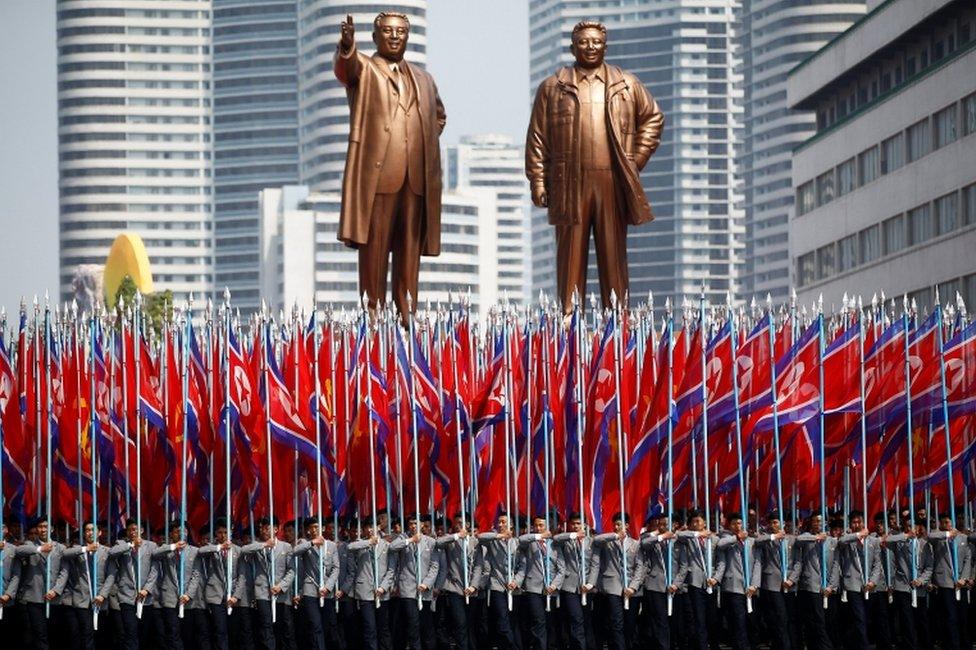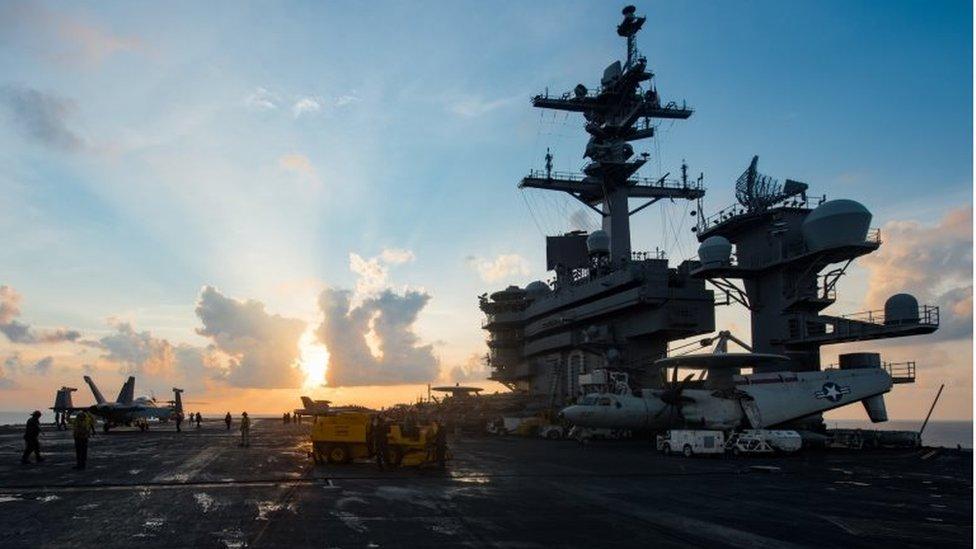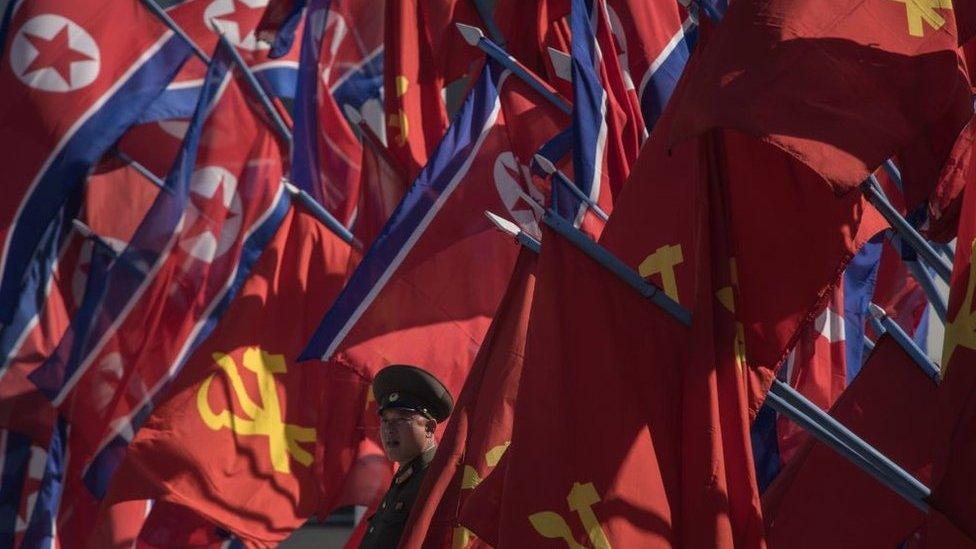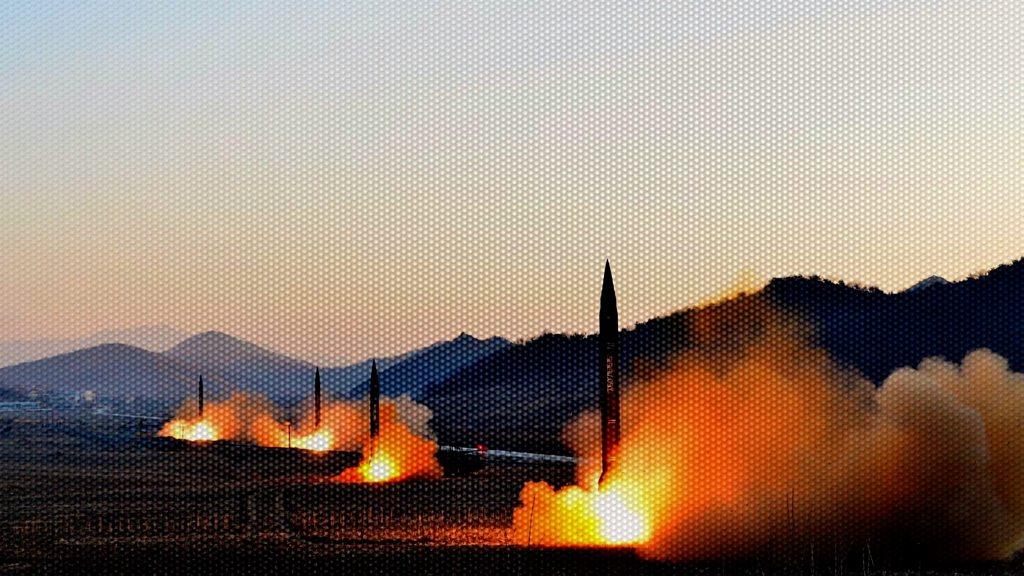North Korea 'ready for nuclear attack' amid show of force
- Published
North Korea used its military parade to send a clear message about its nuclear programme, reports John Sudworth
North Korea has warned the US not to take provocative action in the region, saying it is "ready to hit back with nuclear attacks".
The comments came as North Korea marked the 105th anniversary of the birth of its founding president, Kim Il-sung.
A huge parade in Pyongyang was held amid speculation current leader Kim Jong-un could order a new nuclear test.
Among the hardware on display appeared to be new intercontinental and submarine-launched ballistic missiles.
The show of strength comes amid mounting tension, with a US aircraft carrier group steaming towards the region.
"We're prepared to respond to an all-out war with an all-out war," said Choe Ryong-hae, believed to be the country's second most powerful official.

Kim Jong-un appeared relaxed and laughed with aides
"We are ready to hit back with nuclear attacks of our own style against any nuclear attacks," he said.
Rows of military bands and goose-stepping and sword-wielding soldiers marched through Pyongyang's main Kim Il-sung square for the "Day of the Sun" celebrations, as a black-suited Kim Jong-un watched on.
He saluted an honour guard and took his place on the podium. At times he appeared relaxed and laughed with aides.

Awe and dread: BBC's John Sudworth in Pyongyang

It was an extraordinary and perturbing spectacle. In fact, more than a spectacle. As the thousands upon thousands of soldiers goose-stepped past, in a highly choreographed display of loyalty and unity, you could literally feel the ground shake beneath your feet.
And they kept coming, in perfect formation, on and on, until eventually looming into view behind them, came the heavy weaponry. It included the components of the regime's fledgling nuclear weapons programme - the giant missiles on mobile launchers, their engines growling and competing with the sound of the music and the marching feet.
And then, finally, the residents of Pyongyang began flowing past, dressed in vibrant traditional dress and cheering and weeping as they went. As with the military, as they walked along all had their faces turned towards their watching young leader, Kim Jong-un. It was a two-hour-long master class in totalitarian mobilisation meant to instil awe and dread. I can confirm, conclusively, that it does.

Military planes created the number 105 in the sky.
With concerns that North Korea is getting closer to successfully producing a nuclear arsenal, Saturday's parade was an opportunity for Mr Kim to broadcast North Korea's current military capabilities.
On display for the first time were what appeared to be the Pukkuksong submarine-launched ballistic missiles (SLBMs), which have a range of more than 1,000 km (600 miles).
Weapons analysts said there also appeared to be two new types of intercontinental ballistic missiles (ICBM) in canister launchers, but it remains unclear whether they have been tested and Pyongyang has yet to announce it has an operational ICBM.

North Korea is marking the 105th anniversary of the birth of Kim Il-sung
The nation's aim is to be able to put a nuclear warhead on an ICBM that can reach targets around the world.
It has conducted five nuclear tests and a series of missile launches in pursuit of that goal.
Pyongyang has claimed to have miniaturised nuclear warheads for use on missiles, though experts have cast doubt on that given the lack of evidence.
Saturday's military parade made clear how vital the state's nuclear programme is to its future ambitions, as it continues to ignore growing pressure from the US to abandon its nuclear weapons programme.
On Friday, China's Foreign Minister Wang Yi warned that "conflict could break out at any moment", adding that if war occurred there could be no winner.
Unlike at previous Pyongyang parades there did not appear to be any Chinese representatives present.

The US carrier group deploying off the Korean peninsula is led by the USS Carl Vinson
Adding to Chinese unease, US President Donald Trump said on Thursday that "the problem of North Korea" would be "taken care of".
"If China decides to help, that would be great. If not, we will solve the problem without them! U.S.A."
Vice-President Mike Pence will be in South Korea on Sunday as part of a 10-day Asia trip.
The aircraft carrier USS Carl Vinson and an accompanying battle group have also been sent to the Korean peninsula.
"We are sending an armada. Very powerful," Mr Trump told the Fox Business Network. "He is doing the wrong thing," he said of Kim Jong-un. "He's making a big mistake."
However, Associated Press quoted US officials as saying that the Trump administration was focusing more on raising pressure on North Korea with the help of China rather than using military force.
The US president has recently demonstrated his willingness to resort to military methods. He ordered a cruise missile attack on Syria in retaliation for a suspected chemical weapons attack, and the US military just used a huge bomb against so-called Islamic State in Afghanistan.
How North Korea is testing the US
- Published10 August 2017
- Published15 April 2017
- Published14 April 2017

- Published14 March 2017
